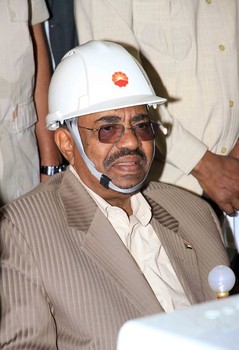Bashir’s lifting of minimum wage leaves Sudan’s 2013 budget subject to amendments
December 30, 2012 (KHARTOUM) – The Sudanese president Omer Hassan al-Bashir on Sunday preempted the work of a committee reviewing the issue of wages and ordered the lifting of minimum wages effective next January.
 Sudan’s official news agency (SUNA) said that Bashir conveyed his decision during a meeting he held with the head of Sudan’s labor union Ibrahim Ghandour and other senior officials from the union.
Sudan’s official news agency (SUNA) said that Bashir conveyed his decision during a meeting he held with the head of Sudan’s labor union Ibrahim Ghandour and other senior officials from the union.
Ghandour was quoted by SUNA as saying that the new minimum wage will be 425 Sudanese pounds (SDG) which is comprised of the old minimum wage of 165 SDG, 200 SDG in pre-existing bonuses granted previously by Bashir and a new increase of 60 SDG.
Based on official exchange rate the minimum wage has jumped from $37 to $96.
The issue of raising wages was a topic of hot discussions between Ghandour and the finance minister Ali Mahmood Abdel-Rasool who insisted that the country cannot afford bumping pay for workers given the current economic situation.
Abdel-Rasool has previously said that doing so would require either raising taxes or further cutting subsidies on fuel and other basic commodities which eats a big chunk of the budget.
But the labor union head rejected either options and hinted at a strike should their demands not be met.
The Sudanese presidency established a commission to review the implications of raising wages and was required to submit its recommendations by the end of next March.
Abdel-Rasool has stressed that should an increase in pay be approved then the 2013 budget endorsed by the parliament this month needs to be amended.
Today’s report on SUNA did not explain how the hike in wages would be funded or when next year’s budget will be adjusted to reflect Bashir’s decision.
Speaking by phone on privately-owned Blue Nile TV this month the finance minister scoffed at Ghandour’s assertions that the wages will be raised starting January 2013.
“After the parliament approved the [2013] budget….[how] are we going to do something [spend more money] outside of the budget?” Abdel-Rasool posed the question.
The national assembly approved the 2013 budget proposal submitted by the government this month which projects 25.2 billion Sudanese pounds (SDG) in revenues and 35.0 billion SDG in expenses leaving a deficit of 10 billion SDG ($1.5 billion) which equals 3.4% of the country’s Gross Domestic Product (GDP).
Some analysts disputed the figures saying the deficit will likely be higher.
Sudan lost 75% of its oil reserves after the southern part of the country became an independent nation last July denying the north billions of dollars in revenues. Prior to the country’s breakup, Sudan produced close to 500,000 barrels but now its output is limited to 140,000 barrels per day. Oil revenue constituted more than half of the Sudan’s revenue and 90% of its exports.
The value of the Sudanese pound has deteriorated sharply against other major currencies and particularly the U.S. dollar which is now trading at 7 SDG compared to an official rate of around 4.4 SDG.
This has fueled inflation which is now at 46% due to the fact that Sudan imports a significant portion of its basic commodities. Ordinary Sudanese citizens are increasingly frustrated about their inability to make ends meet.
(ST)
